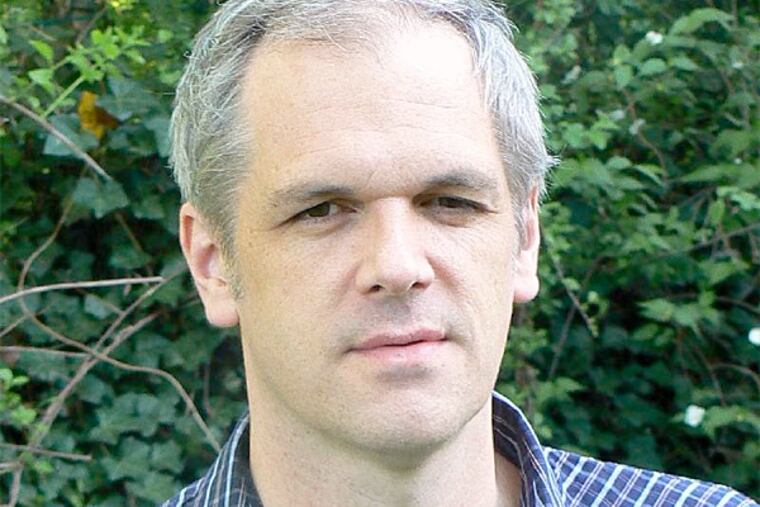Novel takes on Pennsylvania politics and fracking
Thomas Urlacher, the fictional Pennsylvania poet laureate in The Fracking King, describes one of his projects as "sort of like Moby Dick except with fracking instead of whales."

The Fracking King
By James Browning
New Harvest. 192 pp. $23.00
nolead ends nolead begins
Reviewed by Malcolm Bates
Thomas Urlacher, the fictional Pennsylvania poet laureate in The Fracking King, describes one of his projects as "sort of like Moby Dick except with fracking instead of whales." This is a fitting description for James Browning's novel. Browning's encyclopedic knowledge of Scrabble, as well as his expertise as an environmentalist - plus his real, unfakable enthusiasm for both subjects - makes for an entertaining, informative read. The novel suffers somewhat when its politics overtake its art, but it's fascinating and engaging.
At the Hale Boarding School for Boys, the tap water in the bathroom bursts into flames, singeing the eyebrows off one of the students and landing another in a tense meeting with school officials.
Winston Crwth (rhymes with "truth"), the student who witnessed the fireball, puts the administration of the school - funded by fracking money - in an awkward position. The headmaster wants to brush the incident under the rug, but Winston's discretion won't come cheap, as he tells us:
"Win," Goltz said, "I'd like to give you Rich's job as proctor and fire marshal. You get a red hat and two days off each semester."
"I know what I saw," I said. "Do you think you're going to buy my silence with two days off from school?"
"I do."
I used the first day to sleep until twelve thirty.
Winston is a likable character - he almost always means well. But he is too clever for his own good, and his voice sometimes evokes an image of the student sitting front and center in class just waiting for a chance to correct the teacher. He's also a Scrabble prodigy with eyes set on the state championship, the son of an expert in the now-defunct field of "SoFoPo" (Soviet foreign policy), and a newly minted amateur detective.
The subject of his first investigation is his boarding school's murky relationship with Dark Oil and Gas. The company is using school property for a new fracking site after securing the land through questionable financial means - including the grant that got Winston his place at Hale as a "Dark Scholar."
The Fracking King chronicles Win's journey from his new home in rural Pennsylvania to the governor's office in Harrisburg, with forays into competitive Scrabble, virtual reality, and that Pennsylvania poet laureate's suspect use of "found" poetry.
The great strength of the novel is the humor with which author James Browning approaches these topics. His snappy dialogue and backwoods slapstick endear the characters to the reader and eliminate the stuffy courtroom atmosphere usually hovering around the theme of political corruption. It helps that Winston, a self-described "hippie prig" raised in both San Francisco and Philadelphia, is a magnet for the strangest, most repressed figures at his northeastern Pennsylvania school.
We also get some bold experiments with place and character. One of the minor characters, the woefully underexplored Stephen Ha, writes his suicide note into a game of Scrabble, for example. Chief among these experiments, though, is "Leah" (anagram for "Hale"), the virtual-reality equivalent of Hale, where students spend entire days chatting, taking classes, and trying to pass the dreaded swim test - performed with wrists and ankles bound.
Unfortunately, Browning does not capitalize on some of the more interesting secondary characters and subplots because of a somewhat myopic obsession with the political bent of his narrative.
Browning not only coauthored a series of articles exposing political corruption connected to the fracking industry, but he is also the spokesman and strategist for Common Cause, a "nonprofit nonpartisan citizen-led advocacy organization working to hold government accountable and make government responsive to the needs of its citizens." While this lends gravitas and realism to his narrative, in some places it also blurs the line between fiction and propaganda.
At times The Fracking King reads like an anti-fracking fairy tale. When Winston reflects on the immunity he gets in exchange for keeping quiet about the incident with the flaming water, he notes morosely, "Goltz would let me wreck parts of his lectures with my idiotic comments and I would let the frackers wreck Pennsylvania."
Later, David Dark - heir to the Dark family oil and gas empire - points out in a discussion of the Marcellus Shale that just because "we are the Saudi Arabia of natural gas does not mean that we need to behave like Saudi Arabia." Moreover, he gives an interpretation of the Supreme Court's Citizens United ruling that's surprisingly progressive for a future oil tycoon:
"Dark Oil and Gas is a person?"
"Yes, in the eyes of the law. Don't blame me. Blame the railroads who in the nineteenth century pioneered the argument that the Fourth Amendment's ban on unreasonable searches and seizures meant the government could not inspect their cars."
"So railroad cars had the same rights as human beings?"
"Probably more, if you were female or African American."
The book at times resembles a political cartoon more than a nuanced satire. Regardless of your stance on this highly divisive issue, it is in neither the reader's nor the author's best interest to dwell on heavy-handed pontification. The Fracking King would have greatly benefited from a deeper understanding of the shady, eponymous Gov. Linda King LaRue, the tortured Scrabble genius Stephen Ha, and - in particular - the Leah role-playing game.